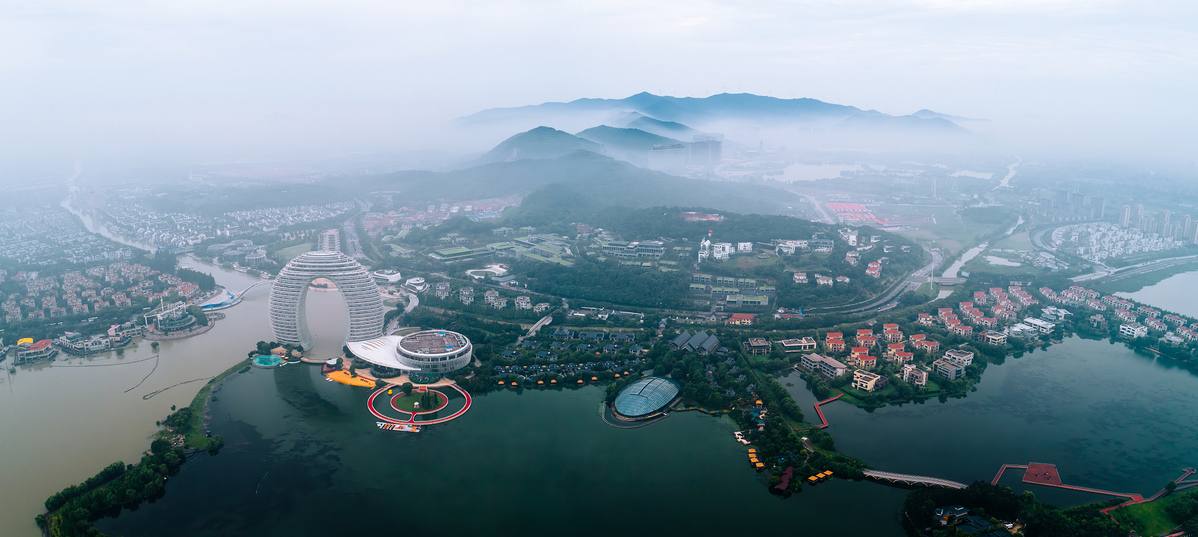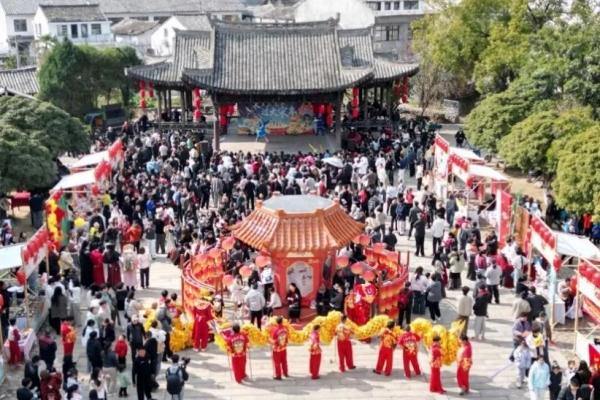
An aerial view of the Taihu Lake scenic area in Huzhou, Zhejiang province. (via China Daily)
As greener lifestyles continue to trend, East China province strives to transform itself into an ecological civilization.
Zhejiang province in East China will firmly implement the Xi Jinping Thought on Ecological Civilization laid out by the Central Committee of the Communist Party of China, fulfilling its mission to build Zhejiang into a pilot demonstration area of the idea, Yuan Jiajun, secretary of the CPC Zhejiang Provincial Committee, told China Daily in an exclusive interview.
Zhejiang is the place where the Thought originated and where the "lucid water and lush mountains are invaluable assets" concept was first implemented.
During his inspection trip to Zhejiang in spring last year, Xi Jinping, the CPC Central Committee general secretary, explicitly urged the provincial government to develop the province into a pilot demonstration area of ecological civilization.
Over the past few years, the CPC Zhejiang Provincial Committee and the provincial government have both striven to fulfill the Double-Eight Strategy-a provincial development plan proposed by Xi in 2003 when he was Party secretary of Zhejiang, in which he listed the province's eight advantages and eight areas of development in light of these advantages-fully implement the "lucid water" concept and collaboratively push high-quality development and environmental protection in the province in an effort to improve residents' livelihood through highly efficient governance and management.
In the process of building Zhejiang into a livable and picturesque place with a superb natural environment, a modern-day Dwelling in the Fuchun Mountains painting is being created, and a successful path of ecological and environmental protection with Zhejiang characteristics has been tapped.
In 2018, Zhejiang's Green Rural Revival Program won the Champions of the Earth Award, the United Nation's highest environmental honor.
According to provincial government data, China has also recognized Zhejiang as its first national ecology province, and the public's satisfaction toward the ecology and environment in the province has been growing for nine consecutive years.
Fighting pollution
Zhejiang has pushed ahead with precise, scientific measures to improve its environment and reduce pollution. It launched special campaigns to clear skies, reducing industrial waste and odors caused by industrial furnaces in key areas, Yuan said.
Further, it has spared no effort in establishing clean-air demonstration areas, weeding out outdated diesel cargo trucks, and reducing the average concentration of PM2.5 particles and ozone.
Through the promotion of river chief, lake chief, and beach chief systems, Zhejiang has worked to make each river and lake green, clean and beautiful, seeking to eliminate odorous water bodies and improving the ecology of coastal areas and industrial parks.
Last year, the average concentration of PM2.5 particles in all Zhejiang's cities stood at 25 micrograms per cubic meter, dropping 19.4 percent year-on-year, with 94.6 percent of the province's water quality above Level III.
The quality of all source areas for drinking-water in Zhejiang above county level meets national standards. Meanwhile, the areas with Level I and II seawater near the coast have expanded by 11.4 percentage points, with that below Level IV decreasing by 13.8 percentage points.
Fostering green development
Over the years, Zhejiang has launched a scientific working mechanism to promote green development by formulating plans to cope with climate change, consummating a profit-driven model of green, recyclable, low-carbon development and setting annual goals for carbon emissions.
Utilizing its advantages in green, low-carbon circulative development, Zhejiang has continued to further its use of clean energy and establish eco-friendly buildings and transportation methods.
The green lifestyle is increasingly becoming fashionable as communities, schools and commercial areas embrace the trend.
Last year, clean-energy consumption rose to 28.1 percent from 21.9 in 2016. A total of 64,842 public toilets were either created or improved, with rural water sewage treatment facilities covering 92.5 percent of all villages in Zhejiang.
Environmental protection
Zhejiang has striven to accelerate environmental protection efforts for the Qiantang River and coastal areas.
Moreover, through investigations and evaluations targeting biodiversity throughout the province, 263 new species have been discovered in recent years. Zhejiang has also taken action to better preserve nature through the establishment of Qianjiangyuan-Baishanzu National Park, Kaihua National Park, and others.
"By 2020, the forestry coverage ratio in Zhejiang reached 61.2 percent, with forest stock topping 361 million cubic meters," Yuan said.
Promoting modernization
Through an ongoing digital reform campaign, the province will launch a complete, comprehensive digital platform to enhance monitoring, supervision, and rectification in the environmental protection sector and strive to strengthen law enforcement efforts to that end.
A digital platform to better administer space and land in Zhejiang will also be launched, adopting virtual reality technologies.
The provincial government has also formulated a raft of laws and regulations to better beautify Zhejiang, setting up long-term goals to make it a poetic and picturesque place by 2035.
"We are committed to consolidating and improving Zhejiang's environment during the 14th Five-Year Plan period (2021-25) to build it into a place as beautiful as the painting Dwelling on the Fuchun Mountains in the New Era," Yuan said.
(Edited by Ye Ke)




